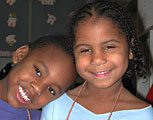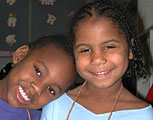Families First: Evidence-Based Support for Parents in Miami-Dade

Check out our blog for social-emotional learning articles, news, and more!

 One of the advantages of the Incredible Years (IY) Parent Training Program is that it can be tailored to meet the needs of parents from varying cultural backgrounds and to address the individual goals and values for each family and child. In numerous randomized control group studies, the IY Parent Program has been shown to effectively promote positive and nurturing parenting interactions, to reduce critical and harsh parenting and to reduce behavior problems in high risk children (Webster-Stratton and Reid 2003). The program has also been shown to be effective with parents of different racial and cultural backgrounds (Reid, Webster-Stratton et al. 2001). In particular, the program has been shown to promote positive parenting in African American, Chinese American, Asian American, and Hispanic parents ((Reid, Webster-Stratton et al. 2001; Webster-Stratton, Reid et al. 2001). Other investigators have replicated these findings with African American families (Gross, Fogg et al. 2003; Miller Brotman, Klein et al. 2003), Hispanic families (Barrera, Biglan et al. 2002), Korean families (Kim, E. unpublished manuscript) and multi-ethnic families in England (Scott, Spender et al. 2001).
One of the advantages of the Incredible Years (IY) Parent Training Program is that it can be tailored to meet the needs of parents from varying cultural backgrounds and to address the individual goals and values for each family and child. In numerous randomized control group studies, the IY Parent Program has been shown to effectively promote positive and nurturing parenting interactions, to reduce critical and harsh parenting and to reduce behavior problems in high risk children (Webster-Stratton and Reid 2003). The program has also been shown to be effective with parents of different racial and cultural backgrounds (Reid, Webster-Stratton et al. 2001). In particular, the program has been shown to promote positive parenting in African American, Chinese American, Asian American, and Hispanic parents ((Reid, Webster-Stratton et al. 2001; Webster-Stratton, Reid et al. 2001). Other investigators have replicated these findings with African American families (Gross, Fogg et al. 2003; Miller Brotman, Klein et al. 2003), Hispanic families (Barrera, Biglan et al. 2002), Korean families (Kim, E. unpublished manuscript) and multi-ethnic families in England (Scott, Spender et al. 2001).
Bringing the IY parenting programs to parents who speak different languages and who represent different cultural backgrounds is a special privilege and opportunity because of the rich diversity of the individuals in the groups and the chance for these families to learn from each other and build support networks. To deliver this program to parents who don't speak English, it is necessary to partner with interpreters who share the linguistic and cultural backgrounds of the parents. We begin this partnership by offering joint interpreters and parent group leaders' training workshops. In this training, group leaders learn about the values, parenting beliefs, and unique problems of each culture while interpreters learn about child development principles, relationship skills, and behavior change strategies as well as the IY parenting program content and methods. Two videotapes of parent groups showing group leaders working with interpreters representing four different languages form the basis for these discussions.
The article is based on transcripts of workshops between Dr. Carolyn Webster-Stratton, several English speaking IY parent group leaders and interpreters representing the following countries: Ethiopia (Amharic, Arabic, Tigrinya, Oromo), China, Vietnam, Somalia, and Mexico. The article begins with a discussion of the special issues and problems for new immigrant families. This information forms the background context for introducing the IY parent program and for addressing the goals that will be relevant for these families. Next principles of effective interpreting for the IY program and for training interpreters are reviewed. The final section includes program evaluation by interpreters after they have delivered the program in collaboration with a group leader.





